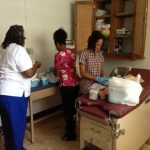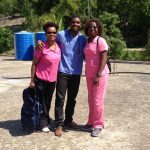The following article was written by our own Jennell Charles. It was published in the Fall 2014 edition of The Georgian Nurse. The people of La Gonave are lucky to have this program focused on their care and sustainable delivery systems.
 For the past two years, nursing students at Clayton State University (CSU), an academic unit of the University System of Georgia, have travelled to La Gonâve, Haiti. In collaboration with the La Gonâve Haiti Partnership and the Episcopal Diocese of Haiti, faculty from CSU designed a study abroad experience to be offered during a Maymester term or summer session. The course provides an opportunity for students to experience a culture different from their own, and beyond their own socio-economic-political context.
For the past two years, nursing students at Clayton State University (CSU), an academic unit of the University System of Georgia, have travelled to La Gonâve, Haiti. In collaboration with the La Gonâve Haiti Partnership and the Episcopal Diocese of Haiti, faculty from CSU designed a study abroad experience to be offered during a Maymester term or summer session. The course provides an opportunity for students to experience a culture different from their own, and beyond their own socio-economic-political context.
Most individuals have not heard of La Gonâve. It is Haiti’s largest island, approximately 38 miles long and 9 miles wide, tucked into the Bay of Gonâve off the west coast of Haiti. A direct flight from Atlanta’s airport will land you in Port-au-Prince, Haiti’s capital, in approximately 3 hours. From there you travel 45 minutes north-northwest along the coast, if the “Tap Tap” traffic is kind, and then across the Bay by ferry or “fly boat.” Once you land on La Gonâve, you’ve stepped back in time about 200 years. Approximately 100,000 residents live on the island, most in isolated mountain villages. Clean water, sanitation, and solar-powered electricity are scarce. The heavily eroded roads are most easily navigated by foot, or by donkey.
Other vehicles travel slowly, taking one hour to travel 4-5 miles. Much of our time on La Gonâve was spent working beside the medical staff of the Wesleyan Hospital, the only “full service” hospital on the island, and the staff of the Bill Rice Clinic, a clinic located in one of the mountain villages. In June of this year, we also initiated maternal mobile clinics, travelling over 2 hours by truck to the villages of La Torre and Ticolette. A nurse midwife from the U.S., who travels all over the globe helping to set up birth waiting centers, travelled with us. When we arrived in Ticolette on June 10, she turned to me with tears in her eyes saying, “No pregnant woman with a medical emergency would survive the trip to the Wesleyan Hospital.”
 These experiences have not been easy ones. We witnessed deaths that could have been avoided, severe malnutrition among young children, and extreme poverty. We experienced the discomfort of sleeping on air mattresses with leaky valves, swatting tenacious mosquitoes, and sweating profusely in sweltering heat. We also experienced gratitude, humility, hospitality, and acceptance. We learned from our Haitian colleagues that much can be accomplished with few resources. And, the commitment and dedication of nurses and physicians to care for those who are ill is a universal trait. As one student wrote, “It was exciting and fulfilling to serve in Haiti, as well as to connect with other RNs students from diverse backgrounds and experiences.
These experiences have not been easy ones. We witnessed deaths that could have been avoided, severe malnutrition among young children, and extreme poverty. We experienced the discomfort of sleeping on air mattresses with leaky valves, swatting tenacious mosquitoes, and sweating profusely in sweltering heat. We also experienced gratitude, humility, hospitality, and acceptance. We learned from our Haitian colleagues that much can be accomplished with few resources. And, the commitment and dedication of nurses and physicians to care for those who are ill is a universal trait. As one student wrote, “It was exciting and fulfilling to serve in Haiti, as well as to connect with other RNs students from diverse backgrounds and experiences.
The highlight of the trip was the realization that there are universal aspects to the nursing role which affirms the importance and impact of the nursing profession.” Travelling globally is never easy. But, positioning oneself to stay focused globally can enrich one’s life and the lives of others. During our last day at the Bill Rice Clinic, the staff threw us a going-away party. They made each one of us bouquets and presented us with a cake. We shall never forget the many gifts and kindnesses of our Haitian colleagues.

